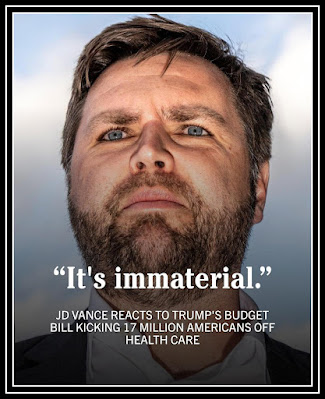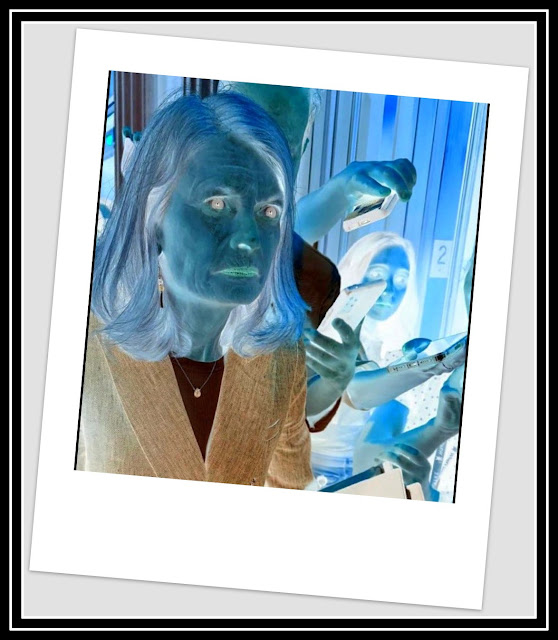We start with the A-bomb impact of COVID-19 in 2020 ("Is This A Wake, Or What?"), and 2021 ("The Long Arc Bends Towards Justice? Suuure..."), followed by the horrors of the Dobbs decision in 2022 ("The Roe Bombshell Drops") and 2023 ("O Beautiful For Spacious Skies [Say What?]"), and the train wreck called 2024, when the Extreme Court wove immunity rights out of thin air, for the benefit of Donald Trump, who'd appointed three of them ("A Republic, If You Can Keep It...But For How Long?").
But, just when you thought things couldn't get worse -- they do. Now that Congress has dutifully done what the Republican Party's Dear Leader demanded of them, the so-called Big Beautiful Bill's passage reminds me of a joke from an aborted Monty Python script intended to follow up the troupe's final film, The Meaning Of Life.
I'm working from memory here, but this moment is documented, and I have read about it. Apparently, one of the Pythons wrote a skit about 19th century explorers trussed up together in a cooking pot. However, in true stiff upper lip tradition, the commanding officer refuses to allow any expression of emotion, even as the heat simmers to a slow boil, and they begin writing around in agony.
Finally, one of the group's members dares to venture a suggestion to his leader:
"Sir! I really believe it would lift the men's spirits, if only they were given permission to panic!"
Alas, the Pythons abandoned the sketch, which would likely have redeemed Meaning Of Life a notch or two. Or jump-started a better film, perhaps. But if you need to vent your alarm -- by all means, feel free. Certainly, the frequent lack of alarm to Trump's latest whimsy has proven one of his defining characteristics, ever since he stepped down that escalator a decade ago, and set about throttling our democracy, and our discourse.
Derrick Van Orden let the mask fall with a clang and a thud, as he thundered at a reporter who dared to question him: “The President of the United States didn’t give us an assignment. We’re not a bunch of little bitches around here, okay? I'm a member of Congress. I represent almost 800,000 Wisconsites."
How Van Orden's constituents judge his vote -- which will decimate his state's rural hospital system, to the tune of an estimated $607 million -- remains to be seen, since pain and suffering doesn't respond to command and control orders. No matter, though, as even so-called moderates representing districts with significant Medicaid populations -- like those of Californian David Valadao, where 67 percent of his residents depend on the program -- also went quietly into that good night, and went along with the charade, too.
But when historians revisit this infamous episode, they will undoubtedly cast Alaska's Lisa Murkowski as the most abject collaborator of the bunch. The woman who played such a major role in spiking her party's 2017 attempted Affordable Care Act repeal sold out her state's most vulnerable residents for a handful of "polar payoffs," such as special concessions for whaling captains. In the end, the Senate's cheapest date went along, all for the mere cost of deducting a harpoon (which costs $10,000, so I've read).
Murkowski's fumbled responses also unmask her as every bit as narcissistic as her counterparts. Her self-defense is all about herself, whether it's her own dropped mask moment ("We're all afraid"), to feigned frustration ("Do I like this bill? No"), and performative concern ("I struggled mightily with the impact on the most vulnerable in this country"). But she will learn, the hard way, what happens to collaborators. History is not kind to them. Just ask Lord Haw-Haw, or Benedict Arnold.
Conditions are now also firmly in place for a full-on police state, with the roundly reviled Immigration and Customs Enforcement (ICE) agency due for $175 billion. The biggest chunks will go toward Trump's border wall obsession ($47 billion), along with a massive network of new detention centers ($45 billion), and a tripling of ICE's enforcement budget ($30 billion). Thanks to all this splurging, ICE will become the nation's largest federal police agency, which doesn't bode well for anyone who isn't white, basically.
This expanded punishment apparatus is made possible by shredding the social safety net, starting with $186 billion in food assistance cuts -- which will affect an estimated 2.9 million Americans, and cut at least 140,000 jobs in food processing facilities, farms, grocery stores, and school cafeterias. Of course, don't forget nearly $1 trillion in Affordable Care Act and Medicaid cuts -- the largest in our nation's history -- that will cause 16 million to lose health coverage. (For a full tally of the resulting social wreckage, see our last post, "Mad King Watch (Take VII).")
Contrast those impressions with the fruits of ICE's poisoned harvest. The US already holds 56,000 people in immigrant detention, which would explode to 116,000, assuming that whole $45 billion gets spent. That figure, by the way, equals the number of Japanese Americans interned against their will during World War II. Could someone have plucked it out of the phone book?
That's hard to believe, especially when you consider how much weight this regime places on quotas and statistics. The coincidences are simply too close to ignore. It's equally hard to imagine wayward migrants alone, real or imagined, occupying those 116,000 beds. As a commenter I saw on Facebook noted, "He's not asking for $45 billion for nothing."
Needless to say, the inner bully in Trump -- and, indeed, the sycophantic thugs who surround him -- is giddy about these developments, as illustrated by his recent visit to the concentration camp he plans on building in the Florida Everglades ("Well, I think would like to see them in many states. Really, many states. And, you know, at some point, they might morph into a system").
Variously dubbed "Alligator Alcatraz," "Alligator Auschwitz," or "Disneyland Dachau," the unfortunates deposited there will end up having to endure sweltering temperatures in tents, crammed shoulder to shoulder. They may even be "asked" to work the land for free, Trump has mused, to earn their way back into society. It's a concept designed to exact maximum suffering, in an ironic echo of the "FEMA concentration camp" conspiracy theories that Republicans routinely aired during the Obama era.
Of course, if Republicans had a sense of irony, they'd hardly be doing the batshit stuff they're doing -- though, as usual, Vice President JD Vance said the quiet part, loudly and proudly, on X: “Everything else—the CBO score, the proper baseline, the minutiae of the Medicaid policy—is immaterial compared to the ICE money and immigration enforcement provisions.”
Critics have rightfully denounced the tone of Vance's comment, even as they miss the subtler point he's making -- that cranking up the national GDP matters less than the mechanics of raw power and revenge. Much, much less. The world's most hyper-militarized society, one that already locks up more of its inhabitants than any other nation, is adding another yet layer to its sprawling prison industrial complex.
Or, to put it another way, in just over a decade, we've fallen from gauzy, made-for-TV images of "hope and change," to a retaliatory state driven by the impulses of an aggrieved minority and its unhinged, self-dealing cult leader. Is this how our long-running democratic experiment ends, after nearly 250 years? Never has the dream felt so gaudy and cheap, so hollow and empty, so broken and betrayed.
Start with the simple math of the 2024 election -- in which "Mr. 47 Percent," as I nicknamed Trump in 2016, modestly improved his overall standing to become "Mr. 49 Percent." Like it or not, he remains a plurality winner, whose constant trampling of democratic norms points to great weakness, not strength. Without them, would he even be in the game?
What's more, Trump does not enjoy the same level of popular support as the strongmen he so fervently admires -- that rocketed Nayeb Bukele to power in El Salvador, and has enabled Recep Tayyip Erdogan to freeze-dry Turkish politics since the early 2000s. If the Trumpian endgame is a police state, it's hard to imagine half the country sitting idly, and just allowing it to happen, unchecked and undisturbed.
That Trump and his goons are already dropping the D-words -- as in, denaturalization, and deportation -- speaks volumes of the threats they feel. What if other cities elect similar leaders who stand and fight, instead of just meekly leaving the building, as so many Republicans have done, since Trump's ill-gotten ascent? That question keeps them awake at night, I'm sure.
It's downright surreal when someone like AOC can't get a leadership position, while six of 12 Democratic incumbents have died in office -- including Gerry Connolly, a mere five months after he leapfrogged her to become the House Oversight Committee's ranking member. Or consider the narcissistic refrain ("Nobody but me," "Who else but me?") that prompted the likes of Joe Biden and Ruth Bader Ginsberg to stay, long past their presumptive sell-by dates. Who defends their decisions now, in light of current events?
Queensland State Government>
Like Trump, Joh spent much of his time pursuing all manner of real and imagined enemies -- from Communists and socialists, to trade unions, and university students, whom he scorned as "Nancy boys." Like Trump, Joh treated the police force as his personal enforcer in severely restricting civil liberties, such as requiring permits for any type of public gathering of three or more people. In other cases, protests were simply broken up with brute force, or the use of staged disturbances.
The resulting outcry also led to the National Party's decimation in December 1989, in which the Australian Labor Party (ALP) gained 24 seats, by over 50 percent of the vote. Long locked out of power by Bjelke-Petersen's machinations, the ALP regained control of Queensland for the first time since 1957 -- marking the final coffin nail in for the now-infamous "Hillbilly Dictator" and his personality cult.
Even so, the outcome didn't stop him from cheekily suing the Queensland government in 2003, alleging "lost business opportunities" due to his fall from power! Not to be outdone, Lewis also sued his legal team for inadequate counsel. Neither suit went anywhere, underscored by the admonishment that Bjelke-Petersen had been lucky to avoid a second corruption trial.
So where does this example leave us, as our 249th birthday winds down? First and foremost, the knowledge that, at a certain point, the system can only absorb so much overreach, before the course of events -- like the Fitzgerald Inquiry -- forces a drastic change.
Third, that there are collateral consequences for those who "go along with the program." Prison terms and public disgrace are two of the more obvious occupational hazards, while the reconstituted Liberal National Party -- as it's called nowadays -- hasn't polled above 10 percent in an Australian federal election since 1997.
Alternet: "Mad King": Analyst Says Trump
https://www.msn.com/en-us/news/politics/mad-king-analyst-says-trump-is-racking-up-offenses-that-caused-a-rebellion/ar-AA1HUT9s?ocid=msedgntp&pc=LCTS&cvid=98cc6af559b0425bbea42fff75fb87df&ei=33
MSNBC: Lisa Murkowski's Megabill Vote Is Everything...:
https://www.yahoo.com/news/opinion-lisa-murkowski-megabill-vote-123714309.html
https://www.yahoo.com/news/ice-175-billion-windfall-trump-103059036.html
https://charliesykes.substack.com/p/the-conscience-of-lisa-murkowski






No comments:
Post a Comment